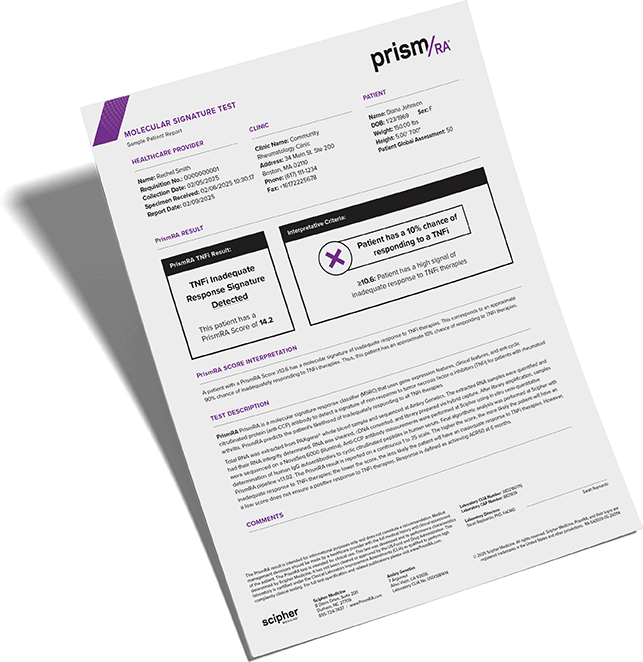
Join Our Newsletter
Learn more about how PrismRA can help guide your RA treatment with our patient focused newsletter.
By clicking Submit you agree to receive marketing emails from PrismRA
Rheumatoid arthritis (RA) affects over 1.6 million
adults in the US, but there has been no way of knowing which of the many medication options is more likely to work for you.1-4
PrismRA brings precision medicine to RA treatment, providing a better opportunity to reach your treatment goals.
PrismRA works by showing if tumor necrosis factor-α inhibitor (TNFi) therapies, one of the most commonly prescribed RA medications, are less likely to work for you. The PrismRA result helps your doctor avoid prescribing this type of medication and instead, begin a medication that may be a better match for you.
Learn more about how to get PrismRA

PrismRA is a personalized blood test ordered by your rheumatologist that delivers insights into which RA medication will work best based on your biology.
With PrismRA, over 3x more patients experience meaningful improvement in disease activity by getting on the right medication sooner, saving valuable time.5

Improved Quality of Life
Improved Work Function
Slowed Disease Progression
Decreased Pain
We have partnered with the Global Healthy Living Foundation, a patient advocacy organization, to help improve the lives of people living with rheumatoid arthritis.
Join the Global Health Living Foundation community for support and other valuable resources.
Ashley believes PrismRA greatly impacts patient care by helping identify the correct treatment plan sooner.
Interested in how PrismRA helps guide therapy decisions? Please contact the Scipher Medicine Client Services team.
References
1. Sacks JJ, et al. Arthritis Care Res (Hoboken). 2010;62(4):460-4. 2.Ogunwole SU, et al. U.S Census Bureau. 2021. https://www.census.gov/library/stories/2021/08/united-states-adult-population-grew-faster-than-nations-total-population-from-2010-to-2020.html. 3. Smolen JS, et al. Ann Rheum Dis. 2020;79(6):685-699. 4. Institute for Clinical and Economic Review (ICER). 2017. https://collections.nlm.nih.gov/catalog/nlm:nlmuid-101704704-pdf. 5. Strand V, et al. Expert Rev Mol Diagn. 2022;22(1):101-109. 6. Burmester GR, et al. Ann Rheum Dis. 2017;76(5):840-847. 7. Osterhaus JT, et al. Arthritis Res Ther. 2009;11(3):R73.